|
|
|
Sort Order |
|
|
|
Items / Page
|
|
|
|
|
|
|
| Srl | Item |
| 1 |
ID:
175055
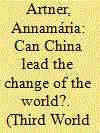

|
|
|
|
|
| Summary/Abstract |
Currently, the world system is in a state of complex crisis and transformation. The overall influence of its US-led centre has weakened, and most of the global periphery is in either chaos or misery. The mechanisms of the global accumulation of capital prevent new global leaders from emerging. Until now, China’s economic ascent has been based on managed market forces and sovereign monetary policy. However, if the liberalisation of capital flows in China continues, the country’s financial independence might be lost. This article explains how the nodal crisis of global capitalism has evolved, how far the marketisation and financial liberalisation of the Chinese economy has gone and the largest obstacles to China further strengthening its influence on the world order. The author concludes that China could play a positive role as a new superpower in constructing a world beyond capitalism, if it does not give up the socialist project, keeps market forces under control, maintains accumulation without dispossession, preserves its financial independence and makes alliances with other nations on the global (semi-)periphery. The latter is particularly important, as the present hegemonic centre will not give up its position peacefully.
|
|
|
|
|
|
|
|
|
|
|
|
|
|
|
|
| 2 |
ID:
175056
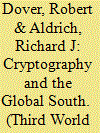

|
|
|
|
|
| Summary/Abstract |
For decades, espionage during the Cold War was often presented as a competition between East and West. The extent to which the Global South constituted the main battleground for this conflict is now being appreciated, together with the way coups and covert regime change represented a continuation of colonialism by other means. Recent revelations about the nature of technical surveillance and signals intelligence during this period paint an even more alarming picture. New research materials released in Germany show the ways in which Washington, London and even Moscow conspired to systematically attack the secure communications of the Global South. For almost half a century, less advanced countries were persuaded to invest significant sums in encryption machines that were adapted to perform poorly. This was a deceptive system of non-secrecy that opened the sensitive communications of the Global South to an elite group of nations, that included former colonial rulers, and emergent neo-imperial powers. Moreover, the nature of this technical espionage, which involved commercial communications providers, is an early and instructive example of digital global information inequality.
|
|
|
|
|
|
|
|
|
|
|
|
|
|
|
|
| 3 |
ID:
175051
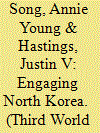

|
|
|
|
|
| Summary/Abstract |
Despite ongoing political tensions and sanctions, North Korea and South Korea have made some progress in forestry cooperation. To explain the persistence of this cooperation, we draw upon a local approach to environmental peacebuilding. By tracing inter-Korean forestry cooperation from 2000 to 2018, this study finds that cooperation persists because of a North Korean desire for cooperation specifically on the environment, and because non-governmental organisations (NGOs) with close ties to the South Korean government provided an alternative way to implement inter-Korean forestry cooperation through periods of tension. Our findings also highlight the benefits of using environmental cooperation as a way to engage with North Korea in a depoliticised and sanction-free context. This finding has far-reaching implications for environmental peacebuilding. First, NGOs can pave the way for engaging conflict parties even in the face of ongoing hostility. Second, environmental cooperation provides an opportunity for a win–win strategy for conflict parties.
|
|
|
|
|
|
|
|
|
|
|
|
|
|
|
|
| 4 |
ID:
175057
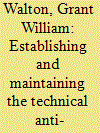

|
|
|
|
|
| Summary/Abstract |
Scholars have sought to explain how and why developing countries establish anti-corruption agencies by examining the strength of national and international institutions, particularly political institutions and actors, international donors and civil society. This article argues that these explanations are inadequate and that explaining the nature of anti-corruption reform in developing countries requires accounting for the transnational technical anti-corruption assemblage. This assemblage comprises individuals, ideas and things that reinforce technical solutions to corruption. This article examines the case of anti-corruption reforms in Solomon Islands during and after the international Regional Assistant Mission to Solomon Islands (RAMSI) intervention (2003–2017). It shows that parliamentarians passed anti-corruption reforms despite declining pressure from donors, relatively weak civil society and wavering political commitment. The article suggests a transnational coalition of national and international actors and objects helped establish and maintain a technical anti-corruption assemblage. Through exclusionary practices, this assemblage helped maintain the technical and apolitical nature of anti-corruption reform. Findings provide insights into the effectiveness of anti-corruption ‘policy transfer’ in Solomon Islands and other developing countries.
|
|
|
|
|
|
|
|
|
|
|
|
|
|
|
|
| 5 |
ID:
175052
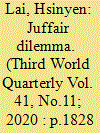

|
|
|
|
|
| Summary/Abstract |
This paper challenges ‘the myth’ of the demise of Arab nationalism after the Arab–Israeli War in 1967 that appears in the scholarship of international relations of the Middle East (IRME). I argue instead that Arab nationalism plays a constitutive role in ideologically linking the issue of Bahrain’s post-colonial state sovereignty and foreign policy on alignment, showing its political salience after 1967 in what I call ‘the Juffair dilemma’: the Al Khalifa regime’s dilemma in aligning with the US after Bahrain’s formal independence. Drawing on Antonio Gramsci’s ‘national-popular collective will’ to re-conceptualise Arab nationalism, the paper further argues that the impact of Arab nationalism on Bahrain’s alignment was revealed through a political struggle between the Al Khalifa regime and the Bahraini New Arab Left, corresponding to wider regional and international anti-imperialist movements in the context of the Cold War. This struggle manifested Arab nationalism as a non-collective will, in which ideological disconnections existed between ‘the people’ and the regime, in Bahrain. It then created the context where the issue of alignment was related to the contestation of sovereignty and the Palestinian question, which was the source of the Al Khalifa regime’s dilemma in making alignment with the US.
|
|
|
|
|
|
|
|
|
|
|
|
|
|
|
|
| 6 |
ID:
175054
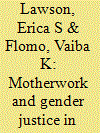

|
|
|
|
|
| Summary/Abstract |
At the end of their country’s 14-year civil war (1989–2003), Liberian women established Peace Huts to provide conflict resolution and mediation services to disputing community members. Peace Huts are modeled on the centuries-old Palava Hut system used to address disputes, but the latter are largely run by men. This article examines how Liberian women have adopted the Palava Hut system to suit their needs in the interest of advancing transitional justice. We document and analyse what women do at Peace Hut sites and how their pursuit of peace and gender justice is related to motherwork, understood in feminist scholarship as the exercise of political agency through maternal activism. Based on a year-long study with women who provide social labour in Peace Huts, this article seeks to provide insight into how women participate in post-conflict initiatives amid infrastructural challenges, structural violence and tensions between the best legal approaches to gender justice and human rights.
|
|
|
|
|
|
|
|
|
|
|
|
|
|
|
|
| 7 |
ID:
175053


|
|
|
|
|
| Summary/Abstract |
Once a baseline resolution to the question of Palestine, the two-state solution has become contested after decades of failed negotiation and renewed support for a one-state solution. This study measures Palestinian university students’ understandings of these different solutions through a representative survey. Results indicate that despite being unconvinced by it, the majority of respondents prefer a two-state solution, although their conception of its specificities differs to that of the Palestinian Authority. Most respondents held unclear ideas of the meaning of the one-state solution. Finally, a model based on analysis of this data explains the reasons and circumstances behind students’ preferences.
|
|
|
|
|
|
|
|
|
|
|
|
|
|
|
|
| 8 |
ID:
175059


|
|
|
|
|
| Summary/Abstract |
Over the past two decades, scholars have developed undone science and inclusive innovation to explain knowledge silos, technology and development for marginalised communities. The undone science framework describes the systematic neglect of scientific issues that impact marginalised groups. The inclusive innovation framework emphasises the need to produce innovations that directly benefit marginalised groups. Despite the similar goals of the frameworks, the undone science and inclusive innovation theoretical communities have not interacted with each other, and as a result, the insights from each framework fail to help other disciplines improve opportunities for marginalised groups. This article compares the frameworks by examining nanotechnology policy and research in South Africa and shows how the frameworks help create better policies for marginalised groups. Because the frameworks emphasise different issues, policymakers should use both frameworks as opposed to over-relying on one of them.
|
|
|
|
|
|
|
|
|
|
|
|
|
|
|
|
| 9 |
ID:
175050
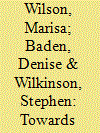

|
|
|
|
|
| Summary/Abstract |
The concept of moral economy can be applied to all types of economies as they all involve conceptions of the ‘common good’ that determine who gets what, why and how, and who is responsible for this distribution, eg state or private actors. In this paper, we use the concept of moral economy to demonstrate how particular morals and logics shape public health governance in Cuba, comparing these with market liberal contexts. The paper draws from ethnographic and interview data from Cuba to evaluate the benefits and drawbacks of Cuban agri-food governance, against the backdrop of market liberal approaches. While Cuban interviewees justified their activities in terms of Cuba’s moral economy of collective need, there were also instances when the socialist moral economy conflicted with individual needs and aspirations. We conclude that, despite its faults, Cuba’s holistic approach to food and agriculture illustrates how ecological approaches to public health might work in practice.
|
|
|
|
|
|
|
|
|
|
|
|
|
|
|
|
| 10 |
ID:
175058
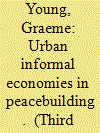

|
|
|
|
|
| Summary/Abstract |
Informal economic activity is often a defining feature of the political economy of conflict and post-conflict cities. Despite its prevalence, however, its implications for peacebuilding remain largely under-theorised. This article draws on the extensive literature on informal economic activity more generally, with a focus on cities, to outline three contrasting perspectives on its significance for peacebuilding: first, that informal economies can support peacebuilding efforts by providing crucial livelihood support and access to essential goods and services in the absence of functioning formal markets; second, that they are a manifestation of resistance to unpopular top-down peacebuilding processes that fail to cohere with local understandings of economic justice; and third, that they can reproduce the conditions that led to conflict by re-establishing socio-economic hierarchies and systems of marginalisation. It argues that each of these perspectives has important implications for the theory and praxis of peacebuilding and raises conceptual challenges that remain unresolved. It then claims that any effort to incorporate urban informal economies into peacebuilding processes must prioritise democratic inclusion, grassroots organisation and formal employment creation if they are to have a meaningful impact on the lives of the urban poor.
|
|
|
|
|
|
|
|
|
|
|
|
|
|
|
|
|
|
|
|
|